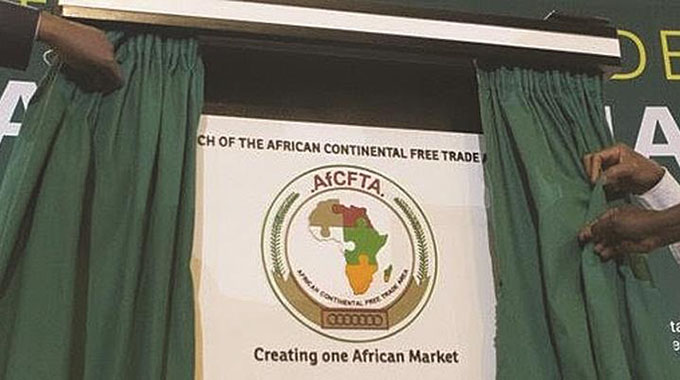‘Lifting ban on imports commitment to AfCFTA’

Michael Tome Business Reporter
THE Government’s lifting of the import ban on selected basic commodities is testimony to the country’s readiness and commitment to fully implement the dictates of the Africa Continental Free Trade Area (AfCFTA) agreement to which Zimbabwe is a signatory.
The AfCFTA agreement came into effect on January 1 2021, however, no trade has as yet taken place under the AfCFTA regime on the continent.
AfCFTA is a broad trade pact entered into by the signatories of the Africa Union (AU) and encompasses the free movement of people, goods, services, infrastructure, and technology development across the continent.
Industry and Commerce Minister Dr Sekai Nzenza said Zimbabwe was still finalising its tariff offer under the AfCFTA and hoped to reap huge benefits from the agreement.
Earlier this month, the Government through the Ministry of Finance and Economic Development, issued measures to promote the availability of basic commodities as a measure to counter the recent spike in prices of locally manufactured goods.
This position has since sparked a massive outcry amongst local industry players as it allowed the flow of basic commodities onto the local retail market.
Among the deregulated imports are rice, flour, cooking oil, margarine, salt, sugar, maize meal, powdered milk, infant milk formula, tea, petroleum jelly, toothpaste, bath soap, laundry bar, and washing powder.
Industrialists d lobby groups, among them Buy Zimbabwe, warned that the move could have unintended consequences, which may lead to destablise recovery in the domestic industry.
As things stand, local industry’s capacity utilisation level in 2021 grew to a decade high of 56,25 percent, which has resulted in 70 percent of goods occupying the retail shelves being locally manufactured.
Industry has since attributed the growth in capacity utilisation to instruments that halted importation of commodities that could be made by local industry.
In an interview, Zimbabwe National Chamber of Commerce (ZNCC) chief executive Chris Mugaga said local industry should not cry foul over the lifting of the import ban on selected commodities by the Government as, by now, it should be able to compete with goods from other parts of the continent under the AfCFTA arrangement.
“We have benefited from Government’s protection for years, including (through) statutory instruments. Right now we are even saying the liberalisation of certain products should be welcomed. Some industries are getting funds and not using them for their intended purpose.
“That is why I am not opposed to liberalisation of those certain product lines because you cannot have an industry in a country which has signed for AfCFTA continue to cry saying we want protection.
“We need to put our house in order, for now, you cannot stop those products from coming here,” said Mr Mugaga.
But economist, Dr Prosper Chitambara said that local industry was greatly disadvantaged in terms of competitiveness compared to regional counterparts owing to a myriad of reasons affecting the smooth performance of the local industry.
He said every policy shift was bound to have tradeoffs with some sections likely to gain while others would lose. He, however, pointed out that the lifting of the import ban was meant to control the runaway inflation on the local market.
“The challenge is we have a huge competitiveness gap in our economy and this is caused by a number of factors which include the equipment which has not really changed over time which puts the local industry at a disadvantage.
“Even though I support competition, the outcry goes on to show that our local industry is still facing a lot of challenges, so for the continental integration I think local industry is not by and large prepared for competition,but this has been made inevitable by the rising prices,” said Dr Chitambara.
Critically, he opined that local industry’s inability to access affordable long term funding coupled with high operating costs resulted in high output costs rendering the local manufacturing sector uncompetitive.
“They (industry) have not been able to get offshore credit or even local credit at concessional rates, which puts them at a point of disadvantage,” he said.
Economist Eddie Cross weighed in on the issue saying most African countries have been caught unprepared by the AfCFTA agreement and called for an exemption from the arrangement.
He, however, noted that the lift of the ban on selected products would not have any detrimental effects on the local industry, but would just fulfill the intended objective to control inflation in food products.
“Zimbabwe has been given time to adjust, it has been granted an extension from the free trade zone for five years, to enable us to get our industry from scratch in terms of competition and capacity.
“I do not think that temporary lifting of import bans on those basic commodities will have any significant impact, I know the local industry has cried foul, but it is to control inflation on most commodities, that is more important at this moment in time,” said Mr Cross.
AfCFTA will be the world’s largest free trade area since the formation of the World Trade Organization as it is expected to cover a market of 1.2 billion people and a gross domestic product (GDP) of $2.5 trillion, across all 55 member states of the African Union.
Consolidating this continent into one trade area provides great opportunities for trading enterprises, businesses, and consumers across Africa and the chance to support sustainable development in the world’s least developed region.
Africa comprises a range of countries from those large and more developed, to those small and less developed.











Comments